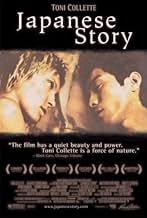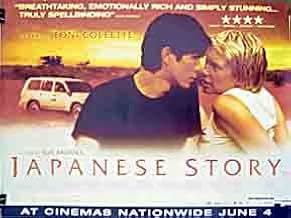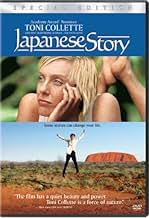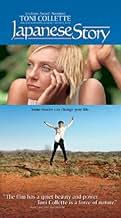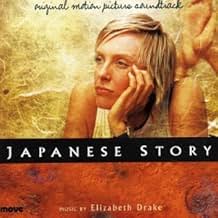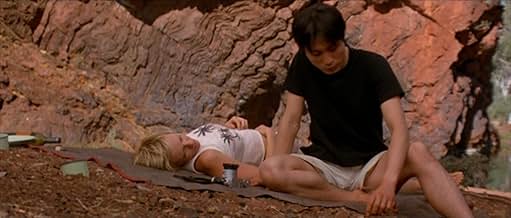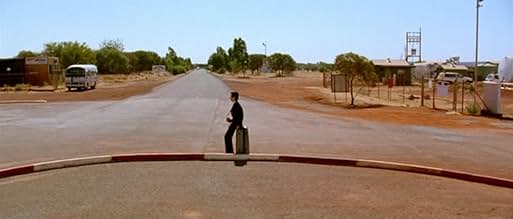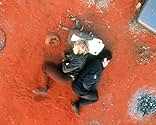Adicionar um enredo no seu idiomaAgainst the background of an Australian desert, Sandy, a geologist, and Hiromitsu, a Japanese businessman, play out a story of human inconsequence in the face of the blistering universe. The... Ler tudoAgainst the background of an Australian desert, Sandy, a geologist, and Hiromitsu, a Japanese businessman, play out a story of human inconsequence in the face of the blistering universe. The end of the journey leaves no one capable of going back to where they started from.Against the background of an Australian desert, Sandy, a geologist, and Hiromitsu, a Japanese businessman, play out a story of human inconsequence in the face of the blistering universe. The end of the journey leaves no one capable of going back to where they started from.
- Prêmios
- 20 vitórias e 13 indicações no total
- Canteen Worker
- (as Jules Hutchison)
Avaliações em destaque
The movie starts off as a fairly standard romantic comedy, involving two strangers who don't like each other very much yet who are forced to spend an inordinate amount of time together. Sandy is a geologist whose company, against her will and better judgment, has asked her to escort an important Japanese businessman through the wilds of the Australian desert on a sightseeing tour. The film even begins to seem a bit like a landlocked `Swept Away' for awhile, as these two headstrong people he a Japanese traditionalist with male chauvinistic tendencies and she a no-nonsense, freethinking, independent woman (but both filled with doubts and insecurities beneath the surface) find themselves stranded in a hostile and remote environment, fighting for survival. But then the first of the film's numerous plot reversals kicks in and we find ourselves in an entirely different situation altogether.
I certainly don't want to spoil anyone's experience of this film by revealing just what those plot twists are, so I will merely state that the film, in the second half, becomes a fairly profound meditation on the precarious nature of life and the almost lightning-paced speed with which tragedy can intervene to bring our worlds crashing down around us. Toni Collette is heartbreaking as the feisty yet warmhearted Sandy and Gotaro Tsunashima is both tender and stoic as the man from an exotic culture with whom she eventually falls in love.
That, of course, is the predictable part. But if you think you know where this story is going, you will be pleasantly surprised at how wrong you will be.
It may not be apparent immediately that you'd be experiencing an emotional ride. But I found the pace just right - right there in the outback environment with the two of them, day, night, very hot, shivering cold, sweating, digging. There's a certain atmosphere to the film - can't quite label it but definitely Australian geographical-oriented - land, nature and people. Thrown into the mix is the Japanese culture for added spice, thoughtfully put together. Hence the joy, jumping for joy, laughter, joking, gentleness, intimacy, we'd understand. The turn of events edifies how unexpected life can be - the yin and yang, the ecstasy and sadness, just at the change of a moment, a motion stunned, numb. The mystery of life and death is utterly incomprehensible by man. The focus is not on grief or state of shock, nor simply on cultural differences, the aim seems further: it almost culminates in the words about the joy given to him, the chance to appreciate the vastness of the space (desert), and being able to open his heart.
The two Japanese roles were well cast: Gotaro Tsunashima as Hiro performed pitch perfect. The role of the wife by Yumiko Tanaka, though brief, is important to complement Collette's role. Both gave just the right dose and tempo to the characters.
The Australian landscape is simple yet breathtaking. Cinematographer Ian Baker and film editor Jill Bicock are both from Australia and had worked together on "IQ" 1994 and "A Cry in the Dark" 1988. Music by Elizabeth Drake and casting by Dina Mann both are former collaborators with the team of Brooks, Tilson and producer Sue Maslin in 1997 ("Road to Nhill").
The film reminds me of w-d Friðriksson's "Cold Fever" (1995) and w-d Clara Law's "The Goddess of 1967" (2000). The former is a road movie of a young Japanese businessman traveling to Iceland to observe tradition and honor his dead parents; the latter is an Australian made film with outback landscapes and an intriguing non-conforming story.
Kudos to Alison Tilson who has written an insightful script, and Sue Brooks who has confidently directed this film made in "forty days and forty nights in the desert." Production by Gecko Films, Australia, and distribution by Samuel Goldwyn Films, U.S., "Japanese Story" is a thought-provoking film to experience.
However, as the story unfolds one becomes aware that there are many more levels to it than one would normally expect. Everything, from the title to incidental characters and the spectacular images of the desert, has been carefully thought out. It raises profound questions about a fashionable subject: identity, but also about love itself. Are these characters in love, or is it merely the terrifying starkness of the Australian outback that has thrown them together? Finally a third person enters the relationship, who complicates matters even further. Despite the romantic overtones of this film it is lifted, ultimately, by its absolute realism. Small gestures betoken whole story lines and glimpses of other characters throw the protagonists into sharp relief. Other influences begin to trickle through: Yasujiro Ozu, Peter Weir (in his early days), Japanese Haiku. And yet this is an entirely original work.
This film had a huge emotional impact on me, but it also made me think, about my own life and about the choices I've made. It did everything that a genuine work of art should do, and without any of the fanfare that we, in the West, have come to associate with art. Small wonder that it got little of the attention that in previous eras it would have attracted. Watch it, and discover that it is still possible to make a classic.
Thanks to the summary line 'The less you know about this film, the better', I curbed my urge to find out more about this film before watching it, something that I'm often tempted to do. If I had known the full plot, I would have been deprived of the dramatic experience of fully empathising with the emotions of the characters.
As others have said, this film is in three parts, call it three acts if you like plays or three movements if you like concertos. The first part is rather cliché, even banal, perhaps by intention. The scene of being stuck in the sand with the wheels spinning feverishly but going nowhere does strike a chord with those of us who have had similar experiences, on sand as well as on snow. The second part starts to intrigue and has all the necessary build-up. It's the third and final part, however, that has given me a cinematic experience that I've never had before. 'Powerful' will be an understatement. 'Powerful' however is not a fair description, because the word conjures up an image of being hit by an abrupt emotional blow. It's not quite like that. There's a sustained drive of waves of emotions, layer after layer. I know I'm getting myself into a lot of trouble saying this, but I think that it needs a woman director to pull this off. It also needs an actress in the caliber of Toni Colette.
Can't finish without mentioning the music. There are in fact a lot of scenes with absolutely no sound, not even the ambiance noise of the vast outback. But when there is music, they're the best. One good example is the love-making scene. But that is soon dwarfed compared with the hauntingly beautiful piece of music that is the background, sometimes just noticeable, sometimes coming forth, throughout the last twenty minutes of the film. Essentially, it alternates between a simple phrase of 8 notes on a plucked instrument and a haunting soprano chorus, blending in perfectly with the mood of the film.
Você sabia?
- Erros de gravaçãoWhen the QANTAS jet to Kyoto leaves, it is actually leaving from the Perth domestic airport. The international terminal, where it would really leave from, and the Darling Ranges to the east, are clearly visible in the background.
- Cenas durante ou pós-créditosOur thanks to the people of Nyamal, Ngarluma, Yinjibarndi, Bunjima and Nyiparli Nations.
- ConexõesFeatured in Inside Japanese Story: an evening with the film-makers (2004)
- Trilhas sonorasABC News Theme
(1986)
Written by Tony Ansell (as T. Ansell) and Peter Wall (as P. Wall)
Published by ABC Music Publishing and
Kindly reproduced with the permission of the Australian Broadcasting Corporation
Principais escolhas
- How long is Japanese Story?Fornecido pela Alexa
Detalhes
- Data de lançamento
- País de origem
- Centrais de atendimento oficiais
- Idiomas
- Também conhecido como
- Japanese Story
- Locações de filme
- Empresas de produção
- Consulte mais créditos da empresa na IMDbPro
Bilheteria
- Orçamento
- US$ 5.740.000 (estimativa)
- Faturamento bruto nos EUA e Canadá
- US$ 647.054
- Fim de semana de estreia nos EUA e Canadá
- US$ 23.962
- 4 de jan. de 2004
- Faturamento bruto mundial
- US$ 4.098.613
- Tempo de duração1 hora 46 minutos
- Cor
- Mixagem de som
- Proporção
- 2.35 : 1
Contribua para esta página








